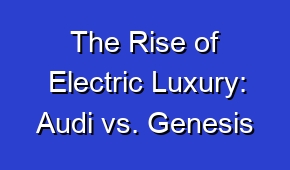Car Depreciation

Car depreciation is the decline in value of a vehicle over time. It occurs due to factors like age, mileage, condition, and market demand. As cars age, their value decreases, making it important to consider depreciation when buying or selling a car.
When it comes to car depreciation, understanding the factors that affect its value is crucial. Car depreciation refers to the decrease in a vehicle’s worth over time. Several key factors contribute to this process, including the make and model of the car, its age, mileage, and overall condition. Depreciation rates vary based on these factors, with luxury cars often experiencing higher rates due to their higher initial costs. Additionally, market demand and economic conditions can also influence the rate of car depreciation. To minimize the impact of depreciation, proper maintenance, regular servicing, and avoiding excessive mileage are recommended.
What is car depreciation and how does it affect the value of a vehicle?
Car depreciation refers to the decrease in value that occurs over time as a vehicle ages. It is a natural and inevitable process that affects all cars. Depreciation can be influenced by various factors, including the make and model of the car, its condition, mileage, and market demand. Understanding car depreciation is essential for car owners, as it impacts the resale value and overall cost of owning a vehicle.
Why is car depreciation considered a significant expense for car owners?
Car depreciation is a significant expense for car owners because it directly affects the value of their investment. As soon as a new car is driven off the lot, it begins to depreciate, often losing a substantial portion of its value in the first few years. This means that the owner will not be able to sell the car for the same amount they paid, resulting in a financial loss. Depreciation is an ongoing expense that should be considered when budgeting for car ownership.
How can I calculate the depreciation of my car?
Calculating car depreciation involves considering the initial purchase price, the estimated lifespan of the vehicle, and its current value. There are various methods to calculate depreciation, such as the straight-line method or using online depreciation calculators. It is important to note that depreciation rates can vary between different car models and can be influenced by factors such as market conditions and the overall condition of the vehicle.
What are the main factors that influence car depreciation?
Several factors influence car depreciation, including the make and model of the car, its age, mileage, condition, and market demand. Luxury cars and vehicles with high maintenance costs tend to depreciate faster. Additionally, market trends, changes in technology, and economic conditions can impact car depreciation rates. Regular maintenance, keeping mileage low, and choosing a popular model can help slow down the depreciation process.
What is the average rate of car depreciation?
The average rate of car depreciation can vary depending on several factors. However, it is generally estimated that a new car can lose around 20% of its value in the first year and around 10% each subsequent year. This means that a car can lose a significant portion of its value within just a few years of ownership. It is important to consider depreciation when deciding whether to purchase a new or used car.
How does car depreciation affect auto loans and leasing?
Car depreciation can have an impact on auto loans and leasing agreements. When leasing a car, the monthly payments are often based on the depreciation value of the vehicle. Higher depreciation rates can result in higher lease payments. Similarly, car depreciation affects auto loans as the value of the car determines the loan-to-value ratio. If the car depreciates faster than the loan is being paid off, it can result in negative equity, making it challenging to sell or trade-in the vehicle.
Can car depreciation be avoided or minimized?
While car depreciation is inevitable, there are steps that can be taken to minimize its impact. Regular maintenance, keeping mileage low, and avoiding excessive wear and tear can help maintain the value of a car. Choosing a popular make and model with good resale value can also slow down depreciation. Additionally, taking care of cosmetic issues, such as scratches or dents, can prevent further depreciation.
Car depreciation can affect insurance premiums as it impacts the value of the insured vehicle. As a car depreciates, its overall value decreases, which can result in lower insurance premiums. However, it is important to ensure that the insured value of the car accurately reflects its current worth to avoid potential coverage gaps in the event of an accident or theft. Reviewing and updating insurance policies periodically is recommended to account for depreciation.
Does car depreciation affect electric or hybrid vehicles differently?
Car depreciation can affect electric or hybrid vehicles differently compared to traditional gasoline-powered cars. Electric and hybrid vehicles often have higher initial purchase prices but can benefit from lower operating costs. The depreciation rates of electric and hybrid vehicles can be influenced by factors such as advancements in technology, battery lifespan, and market demand for eco-friendly vehicles. It is recommended to research and consider these factors when purchasing an electric or hybrid car.
How does car depreciation impact the resale value of a vehicle?
Car depreciation directly impacts the resale value of a vehicle. As a car ages and depreciates, its resale value decreases. The rate of depreciation can vary between different car models, with some retaining their value better than others. Factors such as the car’s popularity, reliability, condition, and mileage play a role in determining its resale value. Understanding the depreciation trends of a particular vehicle can help car owners make informed decisions when selling or trading-in their cars.
What is the relationship between car depreciation and maintenance costs?
Car depreciation and maintenance costs are closely related. Regular maintenance and prompt repairs can help slow down the depreciation process by keeping the car in good condition. Neglecting maintenance or failing to address mechanical issues can lead to accelerated depreciation. Keeping maintenance records and addressing any necessary repairs promptly can contribute to maintaining the value of a vehicle over time.
How does car depreciation impact the cost of ownership?
Car depreciation significantly impacts the cost of ownership. As a car depreciates, its value decreases, which can result in a financial loss when selling or trading-in the vehicle. The rate of depreciation can vary between different car models, making it important to consider depreciation when choosing a car. Additionally, higher depreciation rates can result in higher insurance premiums and potentially negative equity when financing a car.
What are the pros and cons of leasing a car in terms of depreciation?
Leasing a car has both pros and cons in terms of depreciation. One advantage is that the lessee does not have to worry about the long-term depreciation of the vehicle, as they return it at the end of the lease term. This can provide more flexibility and lower monthly payments. However, leasing does not provide any equity or ownership in the vehicle, and excessive wear and tear or mileage overages can result in additional charges. It is important to carefully consider personal circumstances and preferences when deciding whether to lease a car.
How does car depreciation impact luxury or high-end vehicles?
Luxury or high-end vehicles are often subject to higher depreciation rates compared to more affordable cars. The initial purchase price of luxury cars is typically higher, and they can depreciate at a faster rate due to factors such as higher maintenance costs and limited market demand. However, certain luxury car brands or models may retain their value better than others. Researching the depreciation trends of specific luxury vehicles can help potential buyers make informed decisions.
What are the advantages and disadvantages of buying a used car in terms of depreciation?
Buying a used car has both advantages and disadvantages in terms of depreciation. One advantage is that used cars have already experienced their initial depreciation, resulting in a lower purchase price compared to new cars. However, used cars may continue to depreciate, albeit at a slower rate. Additionally, the condition, maintenance history, and mileage of a used car can influence its depreciation rate. It is essential to carefully inspect and research the specific used car before making a purchase.
How does car depreciation affect the decision to trade-in or sell a vehicle?
Car depreciation plays a crucial role in the decision to trade-in or sell a vehicle. As a car depreciates, its value decreases, potentially resulting in a lower trade-in or resale value. It is important to compare trade-in offers with the potential resale value to determine the most financially advantageous option. Timing can also be a factor, as selling a car before it depreciates further can result in a higher return on investment.
What are the long-term effects of car depreciation on personal finances?
The long-term effects of car depreciation on personal finances can be significant. As a car ages and depreciates, its value decreases, potentially resulting in a financial loss when selling or trading-in the vehicle. This loss can impact overall personal finances, especially if the car was financed or leased. Understanding the depreciation trends of a particular vehicle and considering depreciation when budgeting for car ownership can help mitigate the long-term financial impact.
Can car depreciation be reversed or slowed down through modifications or upgrades?
Car depreciation cannot be reversed, but certain modifications or upgrades can potentially slow down the depreciation process. Adding features or accessories that are in high demand or enhance the car’s performance, safety, or comfort can help maintain its value better. However, it is important to consider the potential return on investment and the preferences of future buyers when making modifications, as not all upgrades may increase the resale value.





















